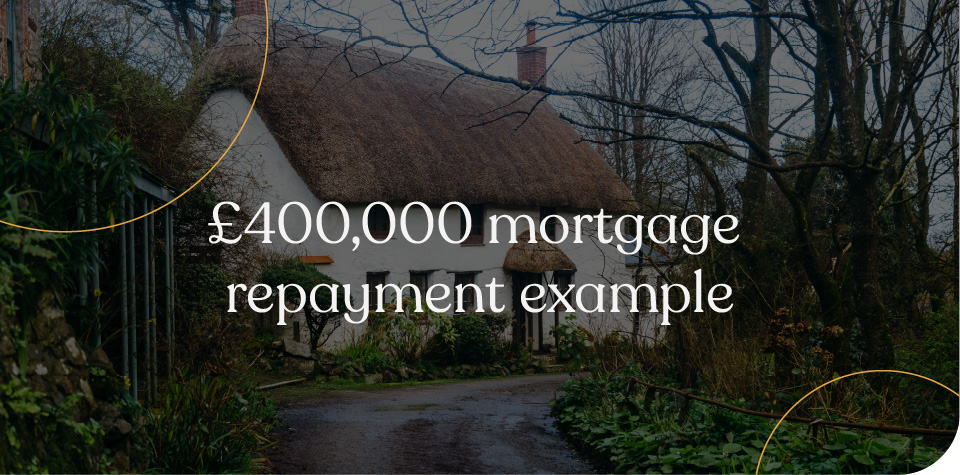
£400,000 mortgage repayment example, best lenders and how to get approved for your mortgage quickly
If you are looking for a mortgage in the £400,000 region, this guide will help you know what to expect and the repayments on this loan size.
We can get you approved quickly; start your application below:
What are the monthly payments for a £400k mortgage loan?
Many customers contact us to learn how much they can afford to repay for a 400k mortgage.
This article is focused on a £400,000 mortgage. It explains what factors most lenders consider before authorizing a £400k mortgage deal and how much monthly mortgage repayments you will be required to pay for a £400k loan.
Even if your credit score is poor or declined, the experts can provide sound advice on a £400,000 mortgage and mortgage repayments.
We are expert mortgage brokers
We have access to over 200+ lenders in the UK to get you the best rates
Get your Quote
What is the average price for a mortgage on a £400,000 home?
There are no one-size-fits-all answers to your question about monthly repayments for a £400k mortgage. Costs for a £400,000 mortgage vary from one case to the next and from lender to lender.
Each mortgage provider has its own eligibility criteria for a £400,000 mortgage. They also have different views about how your personal circumstances will affect the interest rate offered to you and how much your monthly payments will be.
Before we get into the details about how these key elements can influence this outcome, let’s look at our mortgage calculator to give you an idea of how repayments might look.
Loan Corp boasts a large team of expert mortgage brokers who are experts in securing mortgages of £400,000 and over for clients in the UK and beyond.
A £400,000 mortgage home loan amount is an enormous financial commitment. You’re likely to have many questions if you consider applying.
We’ve compiled a guide to help you understand how to apply for a £400,000 mortgage. It also explains when you should seek out the guidance of our team.
What are my chances of getting a mortgage?
Before granting you a loan for any residential mortgage, any lender must consider the following factors when applying for a mortgage. Lenders commonly refer to these as the eligibility criteria.
Are you able to make a mortgage deposit?
A £400,000 mortgage is more likely to approve if you have made a significant deposit towards your home’s purchase. Lenders typically require 10% as a deposit to finance the purchase.
However, the more you are able to put down, the better your terms for a mortgage. Because the loan-to-value (LTV) ratio is lower, there will be less risk for the bank or building society.
What are your current financial obligations?
Look at your monthly expenses and determine if you can afford to make a monthly £400,000 mortgage payment on top of your living expenses.
To determine if you are financially stable, your bank might request copies of your bank statements before you apply for a mortgage.
Also, consider the cost of moving into your new home. How much will you have to pay for utilities, broadband, and taxes? These fees will be added to your mortgage repayments.
How is your personal situation?
Your marital status will affect your eligibility for a £400,000 loan.
You can use both your incomes to determine how much you can borrow. If you are married, you can often apply for a larger mortgage as you will both be named in the contract.
Keep in mind, however, that your chances of getting a mortgage could be affected if your spouse has poor credit or is in significant debt.
Single applicants are still likely to be approved for a £400,000 mortgage. Lenders will only need to verify that you have sufficient income to be eligible for a loan.
For a £400,000 mortgage, self-employed applicants must show proof of income for the past two years.
For those with complex income structures, further investigation may be required. If you depend on bonuses, dividends, or inconsistent wages, prepare to answer additional questions.
Is it possible to get a mortgage for the property you want?
Some providers will not offer mortgages for certain types of property.
Conversions, Grade 1 listed properties, and thatched properties are notoriously difficult to buy unless you’re a cash buyer. Homes near floodplains or properties with short leaseholds don’t usually appeal to lenders.
Our mortgage brokers can help you if you are interested in investing in unusual properties but fear that the High Street banks will turn you down. Our mortgage brokers have access to more specialist lenders that may be able to offer you the best product to suit your needs.
Can I get a £400,000 loan?
You should be eligible to apply for a £400,000 mortgage if you meet the above eligibility requirements.
To be sure you are eligible for a £400,000 mortgage, we recommend that you contact our brokers. They will evaluate your financial situation and determine your suitability.
Start your application below now and let our regulated brokers help you secure the best mortgage for your circumstances.
Get started online
What are the typical monthly repayments for a £400,000 mortgage loan?
Three factors will determine how much you need to pay for your £400,000 mortgage each month.
- Type of mortgage that you applied for. This includes whether you chose a repayment mortgage or an interest-only mortgage.
- The interest rate you pay to the bank or building society for your repayments.
- Your mortgage term averages 30 years.
Lenders will need proof that you have a viable repayment plan if you’re considering an interest-only mortgage.
You can find a variety of £400,000 mortgage calculators online. These calculators use your chosen terms, current interest rates and mortgage product type to determine if you can afford the fees associated with a mortgage this large.
£400,000 mortgage calculator
The mortgage calculator can give you an estimate of your monthly payments for a £400,000 home loan, use it below now:
Interest rates on £400,000 mortgages
Two key factors that can impact the monthly cost of a £400,000 mortgage are the interest rate and the term length.
*The example shown is only for demonstration purposes. It would help if you spoke to Loan Corp to get the most current information and rates.
Loan length – what are your options?
The length of your mortgage term can impact how much a £400k mortgage will cost. This is not just in terms of monthly repayments but also how much interest you pay.
This situation could be saved by taking out a mortgage over a 20-year term instead of a 30-year term.
Our brokers here at Loan Corp can help you get approved for your mortgage quick.
What other factors impact the cost of a £400,000 loan?
Income
How much income do you need to get a £400k mortgage? And what are the implications of your earnings?
Lenders consider income crucial because it indicates your ability to afford a £400,000 mortgage based on your salary.
Your monthly income minus outgoings are used to calculate your affordability. Your DTI is a measure of your income that lenders consider to judge whether you can afford to pay for a mortgage.
Most lenders limit loans to 4 times your annual income. However, some providers will extend loans 5x and others to 6x. Some lenders will even lend 10x your income if you want to secure a loan.
Loan-to-value (LTV)
The amount of money you are willing to borrow is proportional to the property’s worth. This is called the loan-to-value (LTV) ratio.
If you deposit £40,000 (which is 10%) to purchase a property worth £400,000, then you will have bought 10%. You will need a mortgage to cover the remaining 90%. This makes your LTV 90%.
Many residential providers will offer up to 85% LTV. Some are happy with 90%, and some may even accept 95%. As they are less likely to default, those with lower LTV receive the best rates.
Credit history
Lenders will view you as a higher risk if you have an adverse history. As mentioned, every provider has its own eligibility criteria and views about what it will or won’t accept. This holds true for bad credit.
Some lenders won’t accept someone who has suffered any adverse credit event, while others will accept serious cases such as repossessions or bankruptcies.
It all depends on how recent and/or severe the issue is. However, some providers may require a higher deposit or limit the amount they will lend to you.
Please read our guide to getting a mortgage with poor credit or submit an enquiry for more information. We’ll send you to one of our bad credit mortgage specialists.
Age
Many mortgage providers have strict age restrictions, making it more difficult for older people to obtain a mortgage. Some lenders won’t lend to retirees full-stop, while others won’t allow mortgages for those over 70 or 75.
A few lenders cap you at 80 and others at 85. A handful of lenders don’t even have age limits as long as they feel confident you can afford the repayments during or until retirement.
Talk to an expert who will find you the best rates for your situation. Learn more about our section for later-life lending.
Types of employment
Lenders are most interested in those with a PAYE income from a full-time position. Anything else falls into the non-standard income category, which could mean you might be offered lower rates.
If you are searching for a mortgage and you are self-employed, many lenders will require proof of at least three years of accounts before they will give you a mortgage. Others will accept two books, while a few will consider one year of books.
Do not lose heart if you’re in the “unconventional” job bracket. Many specialist lenders will offer competitive loans to self-employed people, as well as those who add benefits or bonuses to their income.
What does the property type have to do with my repayments?
Properties that can be bought-to-let (BTL).
Your £400,000 mortgage can be used for buy-to-let investment. There are many things you should consider.
Lenders will often require a higher deposit, usually 25% or more. Others have income requirements.
The affordability of a loan is determined by the forecast rental income and not just the borrower’s income. Many want proof that the rent from letting out covers mortgage payments by at least 125-130%.
For more information, visit our buy-to-let mortgages page here.
Second homes
If you own a home, and you are looking to get a second mortgage on another, many lenders will consider you a higher risk. Because lenders assume that if you are in financial difficulties, you will prioritise repayments for your primary residence.
A larger deposit is likely to be required for a second house.
There may also be a higher minimum income requirement and additional checks regarding your financial ability.
Types of construction that are not standard
Some lenders won’t lend to properties not of the standard construction type. This includes unique properties, listed buildings, and properties with thatched roofs. Others lenders may consider them, but they will rate them lower and consider them a higher risk.
Some lenders will consider more types of property. You can read more about our non-standard property section.
Take a look at other mortgage repayment examples:
- £120,000 mortgage repayments example
- £150,000 mortgage repayments example
- £180,000 mortgage repayments example
- £200,000 mortgage repayments example
- £300,000 mortgage repayments example
- £350,000 mortgage repayments example
- £450,000 mortgage repayments example
- £500,000 mortgage repayments example
Get your £400,000 mortgage today with Loan Corp
If you would like more information about your £400,000 mortgage, start your application online below now for free:

